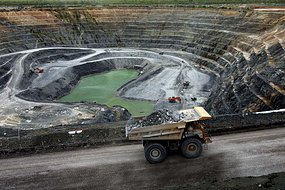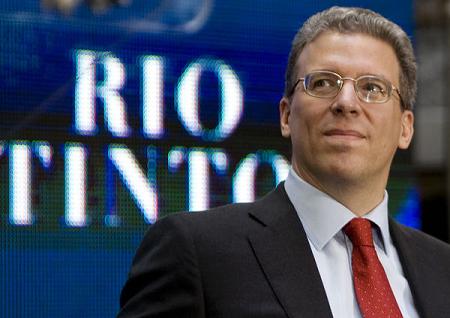(photos/comments added to this article by Axis of Logic)
15 July 2010
|
|
|
Transnational Mining Executive, Tom Albanese |
A speech by Tom Albanese, chief executive of the giant mining transnational Rio Tinto, underscores the key role played by the major mining companies in the June 24 coup that removed Australian Prime Minister Kevin Rudd, and the ruthlessness of the pursuit of their interests globally.
Addressing more than 500 mining executives at a function at the prestigious Lord’s cricket ground in London last Thursday, Albanese made clear that Rio’s extraordinary campaign against the Rudd government’s proposed 40 percent Resources Super Profits Tax (RSPT) was not a one-off action, but that the company would act in the same manner wherever and whenever it perceived a threat to its profit line.
Albanese reviewed his company’s opposition to the super tax, then issued a Mafia-like threat to governments around the world: “Before I leave this topic I want to touch on the risk of the Australian approach being considered by other jurisdictions. I would advise policy makers to think carefully about country specific factors at play; the impact of decisions on international competitiveness; and appropriate compensation for the risks assumed.”
Rio Tinto mining machine symbolizes the corporate monstrosity that can overthrow a government. - LMB
In other words: don’t even think about it, or you’ll go the same way as Rudd.
One of the key concerns of Rio and the other mining corporations, BHP Billiton and Xstrata, was that the Australian super tax could feed into what Albanese dubbed “resource nationalism”, as national governments sought to increase their revenue from the exploitation of mineral resources. The sudden removal of Rudd should make them reconsider.
“Policy makers around the world can learn a lesson when considering a new tax to plug a revenue gap, or play to local politics. And that’s the importance of fully considering the broader economic consequences and continued investment impacts. Such decisions must be made in a wide range of view, in a spirit of consultation and engagement.” One report of the speech noted that the “500 or so mining executives at the dinner lapped it up.”
What Albanese meant by a “spirit of consultation and engagement” has been demonstrated in Australia. After scrapping the RSPT immediately after Rudd’s removal, Prime Minister Julia Gillard announced it would be replaced by a minerals resource rent tax. The details of the new tax will be decided by a committee headed by former BHP Billiton chairman, Don Argus.
'Growing industry'...a truck carries uranium ore out of the Ranger mine (in Australia). Photo: Rio Tinto/David Hancock
The government claimed the loss to revenue from the new tax would only be $1.5 billion out of the $12 billion the RSPT was expected to raise during the next two years. But given that the tax rate had been reduced from 40 percent to 22.5 percent; that it would only start to apply when return on capital exceeded 13 percent (rather than 6 percent under the RSPT); and that the number of companies paying the tax would fall from 2,500 to 320, the government’s estimate was greeted with disbelief. And rightly so. It has now been established that the $1.5 billion figure was purely an exercise in spin, aimed at covering up the real loss of revenue, which, according to the latest Treasury estimates, is anticipated to be $7.5 billion.

Marxists are often criticised by liberals and others for the emphasis they place on the underlying economic driving forces of the capitalist system in shaping political events and determining their outcome. It is altogether too crude, they maintain, to point to the ruthless pursuit by corporate executives of their agenda as the personification of the unrelenting drive for the accumulation of profit.
Albanese provided a living refutation of such criticisms in his speech. He told his audience that he wanted to dispel “the myth that resources are finite, a notion that some policymakers like to promote”. “Resources,” he insisted, “will only become finite if limits are placed on exploration because a country has suddenly become less attractive for investment.”
What follows is that if such barriers are erected, then they must be removed … by whatever means necessary, as was demonstrated in the political coup against Rudd.
Given its explicit nature, it is highly significant that Albanese’s speech has not been widely reported in the Australian media—there has been only limited coverage, buried in the business pages. None of television’s talking heads or newspaper columnists has mentioned his remarks, let alone drawn out their significance.
This is no oversight or accident. It is a conscious response to the events of June 23-24. Under conditions where wide sections of the population are deeply disturbed about the axeing of Rudd, and the more politically conscious layers are becoming alerted to the real forces operating behind the façade of parliamentary democracy, the media is playing a critical role: to prevent any probing of the coup and the forces that organised it. To this end, it has pursued a two-track policy: on the one hand insisting that Rudd was ousted because of opinion polls—even as they show that support for the Labor government remains around the same level as before the coup—and because of his autocratic management style—while losing no opportunity to promote Gillard.
The media’s cover-up will intensify throughout the upcoming election campaign, as it works to ensure that any discussion of the political implications of the coup is suppressed.
But it is a different story within the corporate board rooms and upper echelons of the financial elite, where an intense discussion is underway of the Australian events and their relationship to the deepening global economic turbulence.
Albanese concluded his speech with a reference to the “changing global economy and the challenges being thrown up.” The coming period, he forecast, would see the rise of China and other emerging economies “punctuated by higher volatility triggered by structural dislocations in the OECD countries. This volatility won’t be like the old business cycle, but more like what we have all experienced, over the last two years.”
Such economic instability and “structural dislocations” will have far-reaching political consequences.
The coup against Rudd was a foretaste of the political shocks to come. It demonstrated that the dominant sections of the global financial and corporate elites will increasingly dispense with the trappings of parliamentary democracy and employ dictatorial methods to enforce their interests. The working class must meet this threat by making its own preparations. This requires a unified political struggle for an international socialist program and a workers’ government to fight for genuine democracy. Only in this way can the international working class secure its needs against the dictates of the global financial oligarchy.
